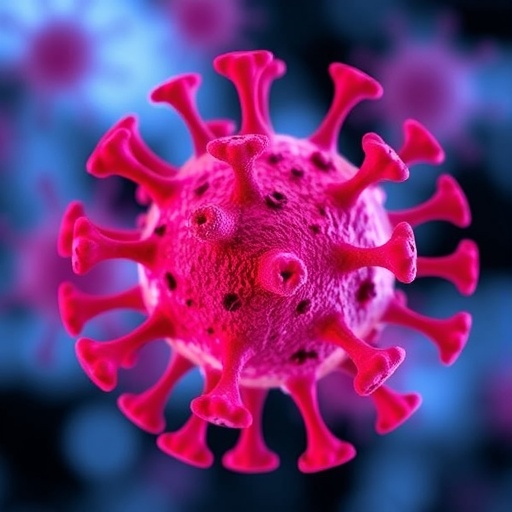
In the evolving landscape of cancer treatment, chimeric antigen receptor T-cell (CAR-T) therapy has emerged as a transformative approach, showing considerable promise in targeting various malignancies, particularly hematological cancers. Traditionally, CAR-T therapies harness the power of the body’s immune system by genetically modifying T-cells to better recognize and attack cancer cells. However, recent revelations have pointed to the significant influence of CAR-negative T-cells, which have been a subject of rigorous exploration in enhancing both the efficacy and safety of CAR-T treatments.
At the forefront of this inquiry are researchers including Sierro-Martínez, Guijarro-Albaladejo, and Fernández-Cisnal, who delve into the complexities surrounding CAR-negative T-cells and their role in the immune response elicited by CAR-T therapies. CAR-negative T-cells, often overshadowed by their CAR-positive counterparts, have received newfound attention due to their intriguing properties. These cells, which do not express the engineered CAR, can either play a supportive role in modulating the immune response or pose a challenge by contributing to immune dysregulation.
The investigation into CAR-negative T-cells stems from a need to address the limitations of conventional CAR-T therapies, particularly the occurrence of severe side effects such as cytokine release syndrome (CRS) and neurotoxicity. These adverse effects have been a barrier to optimal treatment outcomes, leading to the imperative for innovative strategies that bolster efficacy while minimizing harm to patients. In their study, the authors set out to unveil the mechanisms by which CAR-negative T-cells can enhance therapeutic outcomes.
One of the primary revelations from their research is that CAR-negative T-cells may possess inherent properties that can modulate the immune environment following CAR-T cell infusion. By participating in a finely-tuned equilibrium of immune responses, CAR-negative T-cells can help to create conditions that not only facilitate the elimination of malignant cells but also mitigate the risk of overactive immune responses. This dual competency presents a nuanced dynamic that could redefine the application of CAR-T therapies.
The authors highlight that CAR-negative T-cells may contribute to the persistent immune surveillance of residual tumor cells, despite the primary focus being on the CAR-positive T-cells. This adds an additional layer of complexity to our understanding of immune interactions within the tumor microenvironment. The potential for synergistic effects between CAR-positive and CAR-negative T-cells suggests that optimizing the composition and functionality of T-cell populations may enhance therapeutic efficacy.
Moreover, the involvement of CAR-negative T-cells could be pivotal in tailoring personalized CAR-T therapies. Current approaches often apply a one-size-fits-all model, but recognizing the role of CAR-negative T-cells may lead to strategies that consider individual patient immune profiles. Such stratification could enhance the precision of therapy, improving clinical outcomes while reducing the risk of severe adverse effects.
A notable aspect of the study involves understanding the signaling pathways and mechanisms of action of CAR-negative T-cells. These cells may respond to different cytokines and growth factors, playing a role in promoting a favorable immune environment. Through advanced techniques, the researchers delve into transcriptomic and proteomic analyses to elucidate the behavior and interactions of CAR-negative T-cells in the presence of CAR-positive T-cells, aiming to highlight their collaborative roles in therapy.
The implications of these findings extend to the design of the next generation of CAR-T therapies. By integrating strategies that enhance the recruitment or activation of CAR-negative T-cells, researchers may develop approaches that are not only more effective but also come with a lower incidence of side effects. Such developments could inspire a new wave of clinical trials aimed at optimizing therapy across various malignancies.
Furthermore, public awareness and understanding of CAR-T therapy could benefit from the dissemination of these findings. By illustrating the multidimensional nature of the immune response in cancer treatment, researchers like Sierro-Martínez and colleagues can contribute to a more nuanced dialogue about the capabilities and limitations of CAR-T therapies. In turn, this can impact patient outcomes by fostering better communication between healthcare providers and patients regarding realistic expectations.
As the field moves forward, ongoing research and clinical validation of these concepts will be crucial. The incorporation of CAR-negative T-cells into CAR-T therapy frameworks is still in its nascent stages, yet the preliminary insights offer a tantalizing glimpse into the possibility of more comprehensive therapeutic strategies. With rigorous testing and clinical trials, the paradigm of CAR-T therapy could shift, paving the way for more adaptable and less toxic cancer treatment options.
The study authored by Sierro-Martínez and colleagues underscores the importance of continuous innovation within the oncology landscape. By revealing the hidden potential of CAR-negative T-cells, researchers illuminate pathways that fundamentally challenge our understanding of immune-mediated tumor elimination. As the scientific community continues to explore these avenues, the ultimate goal remains clear: to achieve effective, safe, and patient-centered treatment options that can alter the trajectory of cancer care forever.
Through collaborative efforts and interdisciplinary approaches, the vision of personalized medicine in oncology is increasingly within reach. As researchers unravel the complexities of CAR-negative T-cells, the excitement surrounding new therapeutic possibilities fuels ongoing investigations. With a commitment to enhancing patient outcomes, the medical community stands on the precipice of breakthroughs that could reshape the landscape of cancer therapeutics.
In conclusion, as the understanding of CAR-negative T-cells deepens, their integration into CAR-T therapy could represent a pioneering advancement in the fight against cancer. These revelations not only spotlight the need for a more comprehensive understanding of the immune system but also echo the call for innovative strategies that prioritize patient safety while maximizing therapeutic efficacy. The future of CAR-T therapy is poised for evolution, thanks to the insightful research that continues to challenge the status quo.
Subject of Research: The Role of CAR-Negative T-Cells in Enhancing the Efficacy and Safety of CAR-T Therapies
Article Title: Unveiling the influence of CAR-negative T-cells: enhancing efficacy and ensuring safety in CAR-T therapies
Article References:
Sierro-Martínez, B., Guijarro-Albaladejo, B., Fernández-Cisnal, R. et al. Unveiling the influence of CAR-negative T-cells: enhancing efficacy and ensuring safety in CAR-T therapies. J Transl Med 23, 942 (2025). https://doi.org/10.1186/s12967-025-06899-0
Image Credits: AI Generated
DOI: 10.1186/s12967-025-06899-0
Keywords: CAR-T therapy, CAR-negative T-cells, immune response, cytokine release syndrome, cancer treatment, personalized medicine, tumor microenvironment, synergistic effects, clinical trials.
Tags: CAR-negative T-cells in cancer treatmentCAR-T therapy advancementschallenges in conventional CAR-T therapiescytokine release syndrome in CAR-Tenhancing CAR-T efficacy with CAR-negative T-cellsgenetic modification of T-cellshematological cancers treatment strategiesimmune dysregulation in cancer treatmentimmune response modulation in CAR-T therapyneurotoxicity in cancer immunotherapysafety concerns in CAR-T therapytransformative cancer therapies




